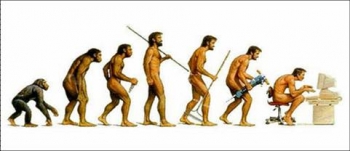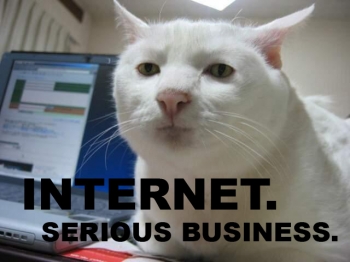One might naively assume that, in an Information Age where current events are accessible through not only conventional news outlets but also grassroots media sharing via the Internet, there would be more people than ever before engaging themselves in positive causes. Compared even with a few decades ago, let alone with most of human history, it is now extremely easy for anyone with regular online access not only to find out about problems occurring almost anywhere in the world, but also to network efficiently with people who share one's concerns. And, unlike the past where distribution of information generally required considerable funding (printing, travel expenses, etc.) which a would-be conscientious activist might or might not have possessed, today it costs virtually nothing to record a video on a mobile phone and upload it to a video sharing site where it could be viewed by a virtually unlimited number of people. In short, the Information Age has largely removed seclusion as an excuse for inaction. As such, if we simplistically expected positive change to increase in proportion with facility of communication, we would wonder why we are not seeing spectacular results before our eyes, or indeed why, instead of getting better, attitudes seem to be going from bad to worse.
Some attribute it to the commonly known Bystander Effect, whereby the more people simultaneously witness to a problem, the less likely any one of them will take the initiative to help, because each waits for someone else to do so. According to this theory applied to our hyperconnected society, the greater the unrestricted sharing of information, the greater the apathy of those who receive it. When information was rare, as it used to be, the few privy to it felt fortunate to receive it, and hence also felt particularly responsible for doing something meaningful in response to it. Now, as exclusive information is increasingly a thing of the past, in other words as everyone is aware that everyone else is just as capable of hearing about a certain issue as themselves, it becomes easy to think that surely there will be plenty of others to deal with the problem, and that one's own participation would make little difference to the outcome.
This theory is part of the answer, but not the complete answer. For is apathy in response to increased information-sharing uniform across all issues? Does not, indeed, the reverse appear to be true in some cases? It has long been known, for example, that cyberspace has facilitated a revival of overt racism and cultural bigotry by providing a platform for mutual reinforcement of us-vs-them mentalities and derogatory attitudes towards perceived outsiders, a trend foreshadowing the rise in physical violence and focused legislation against certain minority groups in several European countries that has accompanied the economic crash of recent years. When it comes to rioting and aggressive behaviour against these targeted groups, more than enough people seem willing to be highly active.
Note that only bad ideas benefit from hyperconnection in this way. Bad ideas cannot stand up to intellectual scrutiny, therefore must rely instead on a show of mass popularity and sheer volume of memetic repetition to bolster themselves (and shout down their critics), which is precisely what hyperconnection has allowed them to do with more convenience. Good ideas, which stand up to intellectual scrutiny by their truthfulness and force of argumentation, have no need for democratic support to be persuasive, hence ironically do not share in this benefit to the same extent.
So it would seem that hyperconnection encourages negative activism more than positive activism. This might be rather depressing, but it is not really surprising. In context, it is only one of many ways in which negative change consistently tends to be easier than positive change. Throughout history, uprisings driven by genuine idealism have been rare compared to those driven by group self-interest, as it requires much less talent to motivate people by the latter. Evolutionary nature compels humans not to strive for improvement that benefits everyone, but to strive for advantages to one's own group relative to another group, simply because those inclined towards latter are more likely to survive and proliferate than those inclined towards the former. The Buddha himself unequivocally stated that falsehood is more easily disseminated than truth in this world, hence predicted the inevitable decay of the dharma through the ages despite all efforts of his disciples to preserve it. Our hyperconnected society has merely served to sharply accelerate this process of decay by accelerating the rate at which all information moves around.
What could be a solution? The Buddha also predicted an eventual restoration of the dharma by the future appearance of Maitreya Bodhisattva. The name Maitreya, rooted in the term metta, refers to the attribute of compassion. The importance of compassion as a motivator for activism may well turn out to be a key element in turning around our plight.
Let us consider: why does the Bystander Effect not apply to self-interested activism? The answer is trivial: when the problem specifically concerns one's own interests, one does not wait for the intervention of others! The Bystander Effect applies when we might be aware that taking action is the right thing to do, but have no personal stake in the outcome. Therefore the simplest countermeasure is surely to develop compassion so that we might feel a personal stake in matters outside of individual or group self-interest. It is not enough to intellectually know that one ought to take action; it is necessary to be emotionally compelled to do so to the same (if not greater) extent as we are naturally compelled to act out of self-interest.
And let us consider further: why has activism based on bad ideas been able to gain traction considering that we all know plenty of people opposed to such ideas? Here too the answer is trivial: too few of those who intellectually oppose such ideas have bothered to make the effort to make their opposition public. More people may oppose such ideas than support them, but if the proportion of opponents willing to be active is far lower than the proportion of supporters willing to be active, then the visible support for the bad ideas is greater than the visible opposition, which is enough for the bad ideas to spread. It takes ethical sense to refuse to participate in aggression onself, but it takes a much stronger force, namely compassion, to be prepared to actively defend potential victims of aggression from aggressors. It is shortage not of ethical sense, but of compassion, that has allowed negative activism to thrive. Only through great increase in compassion, and hence great increase in motivation to counteractivism, might this trend be reversed.
Today, when so many of us - rich or poor, famous or unknown - have a potentially far-reaching voice, and where any changes in collective thinking - positive or negative - can occur more quickly and before a larger immediate audience than in earlier eras, it is more necessary than ever before to refresh and revise our definition of what compassion means. One who merely refrains from all oppressive behaviour in his own life cannot yet be considered compassionate. Only one can be considered compassionate who is prepared to oppose oppression and the ideas that lead to oppression wherever and whenever he encounters them. If this definition for compassion can be set as a new standard, then perhaps we will finally see the spectacular positive changes for which we have waited since the Information Age began.

















